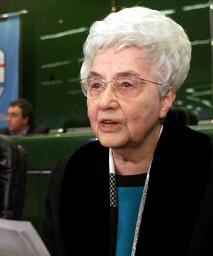Chiara Lubich, the Catholic founder of an important postwar spiritual movement, died on Friday at the age of 88.
Lubich, a close friend of the late pope John Paul II, died in her sleep at her movement's headquarters south of Rome.
She will be buried at Rome basilica St Paul's Outside the Walls on Tuesday. The Movimento dei Focolari (Hearth Movement) will then set about choosing a new leader, which by statute must be a woman. Lubich was born in Trento in 1920 and created the Focolari to help the needy amid WWII bombing raids in 1943. Today the movement for peace and dialogue has six million followers in almost 200 countries and, as the Council of Europe put it in a 1998 award citation, ''inspires the action of millions of men and women of every religion and faith''.
With almost 800 communities around the world, the Focolari aims to foster inter-faith dialogue and promote social justice.
Lubich expanded the movement's activities from charity to ecumenical drives in her later years.
In the late 1990s she spoke to 800 Buddhist monks in Thailand, thousands of black Muslims in a Harlem mosque, and the Jewish community in Buenos Aires.
Struck by Brazilian slum poverty in 1991, she outlined a new economic approach in which firms would give a third of their profits to the poor and a third to training her movement's members.
So far almost 1,000 companies have answered her call. Lubich also wrote numerous publications, including books containing her spiritual reflections. The Focolari Movement publishes 22 magazines in various languages that concentrate on themes connected with peace education.
Besides her 1998 award from the Council of Europe, Lubich received the 1996 UNESCO Peace Education prize.
Italian Foreign Minister Massimo D'Alema paid tribute to her ''tireless work to promote authentic and profound dialogue between Christian churches, between the great religions and people with different beliefs''.
''Chiara leaves a shining heritage of commitment in the service of peace and unity among peoples,'' he said.
The Italian bishops' congress said she had ''enriched the life of the Church in Italy and the world''.













